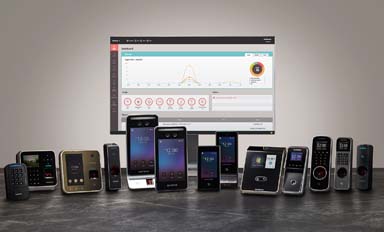SUPREMA
- Neuigkeiten
- Aktuelle Pressemitteilungen von Suprema

As the physical security landscape evolves across Asia, access control systems have become more sophisticated, with biometric technologies leading the charge.
The region, known for its rapid digital transformation and tech-forward approach, is witnessing a surge in demand for more secure and convenient access solutions, with innovations like AI-powered facial recognition and contactless fingerprint technologies gaining significant traction.
In tandem with this technological growth, an increasing focus on data privacy and protection is influencing both product development and regulatory compliance, creating a dynamic environment for access control systems.
In this feature, we explore the key trends shaping the access control market in Asia through insights from industry leaders.
Biometric access control systems on the rise
The shift toward biometric access control systems in Asia is no longer a future trend but a present reality. Leading the innovation curve are AI-driven facial recognition and contactless fingerprint technologies, which are being integrated across sectors from banking to smart cities.
Hanchul Kim, CEO of Suprema, a South Korea-based global security company, explains that facial recognition technology has found a natural home in Asia.
“AI-driven facial recognition technology is particularly popular in Asia, where facial recognition is widely adopted in both public and private sectors for access control and security,” Kim said. “In many Asian countries, there is generally a higher level of acceptance of facial recognition compared to other regions.”
The rise of smart cities and the heightened need for public safety are pushing governments across Asia to adopt facial recognition for projects ranging from border control to public safety initiatives. Countries like China, Japan, and South Korea have embraced these technologies, bolstered by strong governmental backing.
“Governments in several Asian countries have actively promoted the use of AI-driven facial recognition for public safety, and border control,” Kim pointed out. “These government projects have accelerated the adoption and development of the technology across the region.”
Steve Bell, Chief Technology Officer at Gallagher Security, further elaborates on the driving forces behind this growth. He notes that the region's "rapid digital transformation" and increasing demand for high-security solutions in sectors like banking and government are key factors in the widespread adoption of biometric systems.
“Biometric access is always expanding, but the latest innovations include advancements in facial recognition and contactless fingerprint technology, which enhance security and user convenience,” Bell said. “In Asia, these technologies are gaining traction due to increasing demand for high-security solutions in sectors like banking, government, and smart cities, driven by the region’s rapid digital transformation and focus on public safety.”
AI and data-driven innovations
AI plays a crucial role in enhancing the effectiveness of biometric systems by not only improving accuracy but also ensuring a more seamless user experience.
Kim points to Suprema’s efforts in leading the market with its AI-driven facial authentication access control, which has become a hallmark of cutting-edge security technology.
“Asian tech companies have been at the forefront of developing and improving AI and facial recognition technologies,” Kim said. “Suprema is one of major global security company based in Asia, that is leading the most advanced security technology including AI-driven facial authentication access control. Tech companies across China, Japan, and South Korea are driving innovation and making the advanced technologies more accessible and effective.”
AI’s role in enhancing security extends beyond facial recognition. It also aids in predictive analytics, helping organizations forecast potential security threats and respond preemptively.
By integrating these capabilities into access control systems, companies can offer solutions that not only authenticate users but also contribute to overall security management in real-time.
Asian companies have similarly been incorporating AI in their systems to improve both security and user convenience. Industry experts have earlier highlighted that advancements in “contactless fingerprint technology" have been pivotal in maintaining hygiene standards and streamlining user experience, which has become increasingly important in the wake of the global pandemic.
Navigating the complexities of regional privacy regulations
While technological innovation in access control systems continues to flourish, the increasing emphasis on data privacy is shaping how these technologies are designed and implemented across Asia.
The region is slowly aligning itself with global standards for data privacy, although, as Kim acknowledges, it has generally followed behind Europe in terms of both the development and enforcement of comprehensive privacy regulations.
“Suprema complies with Korea’s Personal Information Protection Act (PIPA),” Kim said. “It is one of the most stringent privacy laws in Asia, aligned with global standards, requiring companies to obtain explicit consent before collecting personal data. Also, Suprema complies with global standards such as GDPR, NIS2, PSTI, NDAA, ISO/IEC certifications continuously enhancing reliability of the products and services. At all stages from product design to development and offerings, Suprema adheres to all privacy and data protection regulation in the world.”
Beyond South Korea, other nations in the region are developing their own privacy frameworks, such as India’s Personal Data Protection Bill (PDPB), which is expected to bring significant changes to how companies manage personal data.
“New developments in regional privacy regulations are driving access control technologies to prioritize data encryption, user consent, and secure data storage,” Bell said. “These regulations are influencing manufacturers to adopt secure-by-design principles, ensuring that biometric and mobile credential systems comply with local legal frameworks while maintaining robust security standards.”
The emergence of privacy laws has presented both challenges and opportunities for access control companies.
On one hand, they must invest in more secure data storage and encryption technologies, ensuring that users' biometric data is not exposed to breaches. On the other hand, this regulatory push gives companies that can demonstrate compliance a competitive edge in markets where data privacy is a growing concern.
Future outlook: expanding market and technological innovation
The access control market in Asia is poised for continued growth, fueled by both innovation and regulation. As countries across the region adopt more stringent privacy laws, companies will need to balance technological advancements with the need for robust data protection.
For instance, further growth in mobile credential systems, which allow users to unlock doors using their smartphones. These systems, while offering convenience, will also need to meet the demands of new privacy laws, ensuring that user data remains secure and is not exploited without consent.
Moreover, the demand for high-security solutions in sectors such as healthcare, education, and critical infrastructure is expected to further drive innovation in access control systems.
Conclusion
Asia’s access control market in 2024 is a dynamic environment shaped by cutting-edge technologies, including AI-driven facial recognition and contactless biometrics, and a growing focus on data privacy regulations.
As the region continues its rapid digital transformation, access control systems will need to evolve in tandem with both technological innovations and regulatory requirements.
For companies like Suprema and Gallagher Security, the ability to navigate this landscape—balancing innovation with compliance—will be key to maintaining their leadership positions in this competitive market.
As more Asian countries implement stringent privacy regulations, manufacturers that prioritize secure-by-design principles and data protection will stand out as trusted partners in a region that is increasingly focused on both security and privacy.
Source: asmag.com













